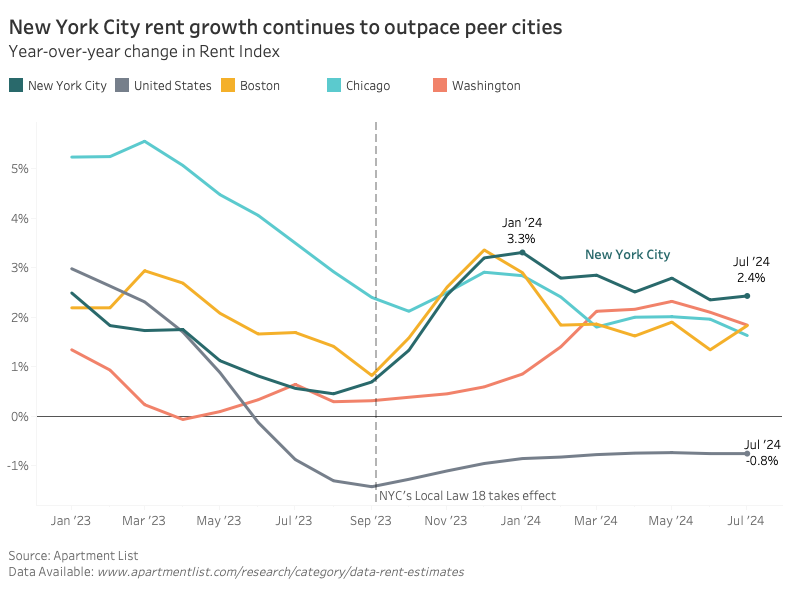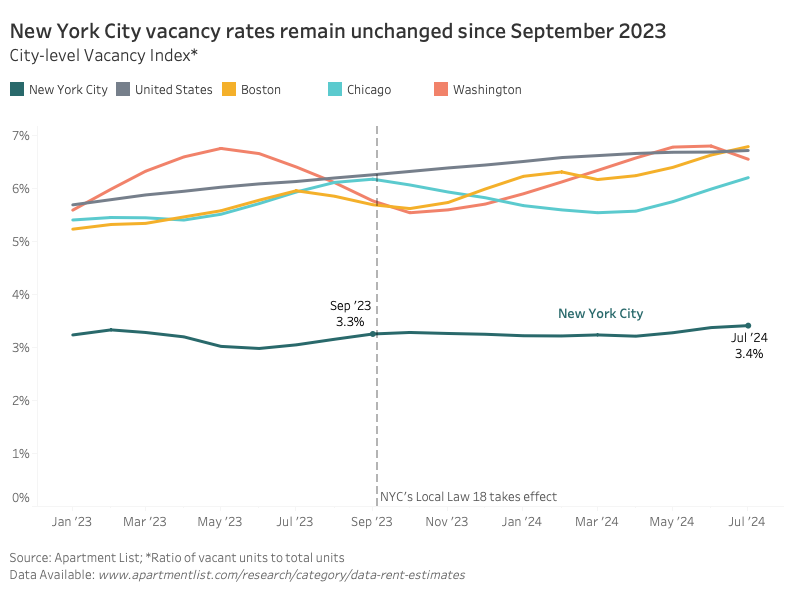After all, how easy it is to live in New York even after the Housing Crisis Act
A year after they were enacted, New York’s short-term rental regulations have failed to deliver on their promise to combat the housing crisis.
Following the crackdown, consumers are facing historically high hotel prices, while residents are also burdened with high rents.
This is also supported by Airbnb, which in its related research cites new data that highlight the consequences of New York Law 18 (LL18), which is an exceptional case in terms of short-term rental regulations.
Since the new regulations took effect, the results have been based on predictions, such as rising hotel prices, dashing the average traveler’s hopes for a trip to New York.
According to CoStar data, average hotel prices in New York City rose 7.4% over 12 months, compared to just a 2.1% increase nationally.
Despite the expectations created by the law, rents are still rising, while vacancy rates are holding steady.
Lawmakers claimed that Act LL18 would ensure affordable housing, but all indications from the past year show that this approach has not produced the results the law promised.
Alicia Glenn, New York City’s former deputy mayor for housing under Mayor Bill de Blasio, went a step further, arguing that she has never seen data showing that short-term rentals are affecting the housing crisis in a significant way.
A year later
According to Airbnb, rents in New York continue to rise.
Lawmakers promised that banning Airbnb in New York would free up housing.
Instead, rents rose by 3.4% in the first 11 months of the law’s implementation, according to StreetEasy, indicating that other factors are driving up rental prices.
In fact, the median asking rental price in midtown Manhattan hit an all-time high of $5,000 for the first time.
Vacant apartments remain at the same levels:
According to Apartment List, apartment vacancy rates in New York City have remained nearly unchanged (3.4%) since the law was implemented.
New York still works the other way around compared to other major cities: While rents may have “calmed down” nationally, in New York even after the law was implemented, rent growth continues to outpace that of neighboring cities such as Boston, Chicago and Washington. At the same time, New York’s vacancy rates continue to lag significantly behind Chicago, Boston and Washington.
As Theo Yedinsky, vice president of public policy at Airbnb, commented “New York’s short-term rental regulations have failed—disproportionately affecting communities in the outer boroughs, driving up travel costs, and ultimately failing to solve the housing crisis. Instead of making prices more affordable, the new regulations shut out everyday consumers while leaving erstwhile hosts struggling to make ends meet».
What’s happening in the areas outside of Manhattan
With most of New York’s hotels concentrated in midtown Manhattan, Act LL18 greatly reduced the available lodging options in the other boroughs, thereby limiting where travelers can stay and where and how they spend their money.
In much of the city, Airbnb listings served areas without hotel options.
Prior to Act LL18, Airbnb listings were geographically spread across all five boroughs, unlike hotels, with less than half of Airbnb listings in Manhattan, while Brooklyn and Queens were home to 37% and 13% respectively of Airbnb listings, respectively.
In 2023, the average Airbnb guest in New York City spent an average of about $260 per day, with over 1/3 of the spend occurring close to where the apartment was located2 .
The lack of available short-term rentals disproportionately affects other areas, leading to reduced stays and reduced spending outside of Manhattan.
Organizations like the Brooklyn Chamber of Commerce have sounded the alarm about the law’s uneven impact.
In a city where the cost of living continues to rise, the loss of income has devastated those who rely on home-sharing to cover basic expenses, as well as small businesses that depend on tourism revenue.
“The reality turned out to be a significant blow to Brooklyn’s tourism and local economy, without the corresponding increase in rental availability promised by the government. We hope the City Council will carefully review the law to support local homeowners and the economic development of communities in the other boroughs (outside of Manhattan),” said Randy Peers, President and CEO at the Brooklyn Chamber of Commerce, in an opinion piece. in the Brooklyn Paper.
These concerns were echoed by the Dominican American Chamber of Commerce, with CEO and founder Manuel Lebron stating: “Local Law 18 has favored big corporations at the expense of the middle classes and local small businesses. With rental prices rising and many families relying on short-term rentals for extra income, the law has created a financial strain on individual hosts and reduced revenue for local businesses that thrive on tourism».
An Alternative Way to the Future: Reviewing the LL18 Act
Even the bill’s sponsor, former councilor Ben Kallos, said families renting a single space should not “worry”. A year later, that couldn’t be further from the truth. The solution to solving LL18 lies in a more balanced approach that recognizes the value of short-term rentals while simultaneously addressing one of the root causes of the housing crisis – building more homes.
“It is time for New York to review LL18 and consider amendments that would at least allow homeowners to welcome visitors again. By revising some parts of the law, the city can increase the supply of accommodation for consumers, support resident hosts and revitalize local businesses that depend on tourism revenue. A more sustainable, sensible and fair model benefits residents, visitors and the wider community – ensuring that regulations support, rather than stifle, community development and economic growthsaid Theo Yedinsky, Vice President of Public Policy at Airbnb.
Source :Skai
With a wealth of experience honed over 4+ years in journalism, I bring a seasoned voice to the world of news. Currently, I work as a freelance writer and editor, always seeking new opportunities to tell compelling stories in the field of world news.












